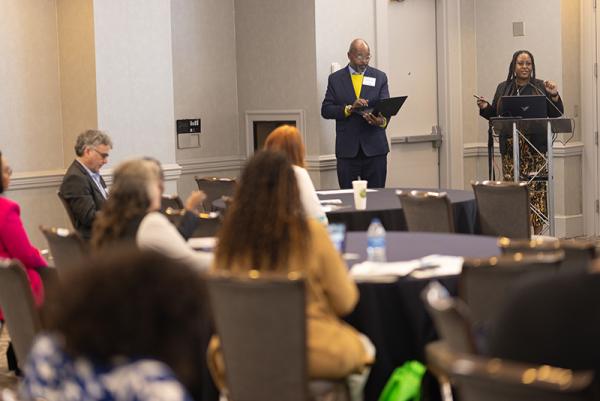CEAL Community of Practice Launches Peer-to-Peer Learning Series
As part of its goals to promote knowledge sharing and partnership, the Community Engagement Alliance (CEAL) Community-Based Organization Community of Practice (CBO CoP) held the first installment in its new Peer-to-Peer Learning Series in April 2025. The Peer-to-Peer Learning Series was created by CBOs for peer CBOs within and beyond the CEAL network. The series allows CBOs to learn about community-engaged research (CEnR) and how to enhance their role in research.
Based on the interests and direction of the CBO CoP, the series kicked off with a discussion on effectively including community health workers (CHWs) in CEnR. Across the CEAL programs, CHW methods are a frequently used approach to CEnR. This session explored the topic from the perspective of CHWs themselves.
The session started with a panel discussion on the extensive roles of CHWs in research, including:
- Helping individuals navigate and understand research,
- Educating health care providers and researchers about community health needs, and
- Providing community-specific, tailored health education on chronic disease prevention, physical activity, nutrition, and more.
Next, CBO representatives shared tips on integrating CHWs into clinical research and CEnR. Thanks to their knowledge of the community’s people and priorities, as well as existing trust, CHWs have unique skills that enable partnerships with research teams throughout the research process.
Participants talked about the role of CHWs in all stages of research, from study design to dissemination. CBOs and CHWs have a deep understanding of the community’s health priorities and can be involved in recruitment, connecting the research team to eligible community members. They can also help collect data, carry out programs, and serve as first or co-authors of research papers. CHWs can also distribute study results to the community. These roles contribute to the foundation of trust and encourage reciprocity that is vital to that trust-building.
The quality of the research performed is strengthened by involving and highlighting the role of CHWs in the process. Beyond including CHWs in the planned study design, researchers can team up with CHWs to address their community’s health priorities and begin their own research. Researchers can also build CHWs’ knowledge and skills by sharing access to resources, toolkits, certifications, program-specific workshops, and workforce trainings. Working together, researchers and CHWs build a sustainable and respectful foundation for future research opportunities.
The peer-to-peer learning series will continue bimonthly, with input from CBOs on future topics. The next session is scheduled for Tuesday, June 10, and will focus on Priority-Setting Tools for CBOs in a Changing Landscape.
Learn more about the involvement of CHWs in CEnR from an interview with the CBO’s Co-Chairs here.
For more information about CHWs, check out CEAL’s CHW Fact Sheet.

The CBO CoP Co-Chairs, Donald Young, CHW, and Adlaide Holloway, B.S., lead a session at CEAL’s 2025 Annual Meeting on the critical role of CHWs.
Last updated: May 30, 2025